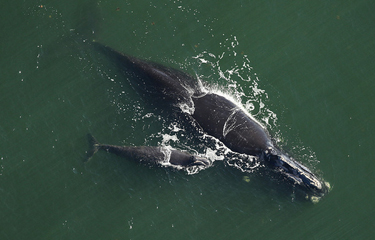The International Union for Conservation of Nature’s recent Red List publication has indicated that the North Atlantic right whale is now officially classified as “critically endangered.”
The classification is reserved for animals that are on the brink of extinction in the wild. Currently, its estimated that only 400 right whales remain, and of those, only one-quarter are reproductive-aged females capable of producing more calves.
"The right whale has been heading downhill for 10 years now," said Justin Cooke, the IUCN assessor for the species and a scientific advisor to IFAW, the International Fund for Animal Welfare, in a release. "Although there has been some progress in reducing ship strikes, fatal entanglements in fishing gear have become more frequent. We'll lose this species unless we can continue to reduce all vessel interactions with right whales and ensure that only whale-safe fishing gear is used."
Without action at the federal level by both the U.S. and Canada, the outlook for the species is grim, according to IFAW Senior Director Patrick Ramage.
"Prompt action is needed to eliminate vessel strikes in both U.S. and Canadian waters. Until both nations put effective measures in place, whales will continue to be brutally injured and killed in this way," Ramage said. "Entanglements in vertical buoy ropes used extensively in lobster and crab fisheries also present a critical, lethal threat. As the IUCN Assessment notes, some 83 percent of the individuals that make up the right whale population have been entangled at least once."
The status update comes just weeks after another right whale was discovered dead off the coast of Elberon, New Jersey, on 25 June. That whale, which was the first observed death in U.S. waters in 2020, was one of the 10 calves reported in the 2019 and 2020 season. An autopsy of the whale later indicated it was the victim of at least two separate vessel collisions.
The shrinking number of right whales has been leading to pressure on fishing industries in the U.S. and Canada due to entanglement-related mortalities, such as one off Martha’s Vineyard in Massachusetts and another found entangled and dead off Nantucket in Massachusetts, among others. The National Marine Fishing Service recently rejected a proposal by the Maine lobster industry to protect the whales, saying more needed to be done. In addition, on 9 April U.S. District Judge James Boasberg filed a 20-page order declaring the American lobster industry in violation of the Endangered Species Act.
The new classification by the IUCN now puts right whales in the same category as species like the even more rare vaquita, a species which resulted in a U.S. ban on certain seafood from Mexico due to the U.S. Marine Mammal Protection Act.
The classification, according to Jane Davenport, senior attorney at Defenders of Wildlife, is also a “call to action.”
“For nearly a century, North Atlantic right whales have been protected from the commercial whaling that pushed them to the brink of extinction, and yet they continue to be killed by human activities. Deaths from fishing gear entanglements and ship strikes are entirely preventable, yet we’ve responded with half-measures at best,” Davenport said in a release. “This status change is a call to arms: unless we act decisively to turn the tide, the next time the right whale’s Red List status changes it will be to ‘extinct.’”
Photo courtesy of NOAA







